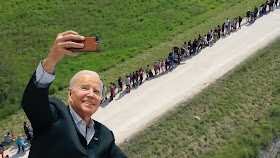Alexei
Navalny, Russia’s preeminent political prisoner and opposition leader, has been
assassinated by Vladimir Putin’s dictatorship. His death was announced on
Friday by the Russian Penitentiary Service in the midst of the Munich Security
Conference, marking the grim anniversary of the infamous policy-setting
anti-Western speech that Putin had delivered at that same conference in 2007.
This time, Putin’s message to the West was written in blood.
The
charismatic anti-corruption activist’s killing took place in the infamous Polar
Wolf Siberian penal colony to which he had been transferred in December ahead
of next month’s presidential elections. Navalny had spent the last three years
being shuffled around ever more brutal Russian penal colonies, in the process
becoming the world’s most prominent political prisoner. According to reports in
Russian outlets, his death was preceded by the arrival of Federal Security
Service (FSB) personnel at Polar Wolf and the disconnecting of CCTV cameras at
the facility. Navalny’s body, which reportedly bears marks of bruising in keeping with
an attempt to resuscitate a victim of cardiac arrest, is currently unaccounted
for, most likely to keep an autopsy from being performed.
Navalny is
the latest in a series of high-profile opposition leaders and dissidents to
be assassinated by the Russian state. Putin’s most
visible and outspoken opponent had spent the last three years imprisoned under
the most austere and barbarous conditions that Russia’s prison camp system
offers. In fact, Putin had been so terrified of the challenge that Navalny
posed to his system that he has spent years steadfastly refusing to utter his
name. The murder of the Kremlin’s most audacious and charismatic political
opponent—one who earned his political stature through his superhuman courage—a
month before upcoming elections sends an unmistakable message to any other
Russians countenancing opposition to Putin’s police state.
The son of
a Soviet army officer, Navalny will be remembered by history as the opposition
figure who constituted the most serious challenge to Putin’s
quarter-century-long rule. Tough and physically imposing, Navalny was also a
lawyer by training who brought idealism for a better and “more beautiful
Russia” to Russians beaten down by the corruption and brutality of Putin’s
rule. He made the dream of a normal Russia into a reasonable one.
The
Anti-Corruption Foundation that Navalny and his team created in 2011 found ways
to cleverly circumnavigate the Kremlin’s de facto taboo on opposition politics
through the deft exposure of the system’s immense inefficiency and corruption.
The foundation was eventually declared an extremist organization a decade later
and banned in Russia much like al-Qaida, the Taliban or Islamic Jihad, in part
for documenting Putin’s network of lavish hideaways and special conveniences,
including a “ghost train” equipped with a Turkish bath, a private operating
room, and a cosmetology suite.
With his
vital charisma, organizing skills, roguish impertinence and endless energy, the
handsome Navalny seemed to represent the most viable successor to Putin. As a
young political activist, Navalny took hard nationalist positions while
competing for the nationalist vote and made ugly comments about Muslims and Georgians—and was
kicked out of the opposition Yabloko party for doing so. This would presage his
obstreperous relations with other Russian opposition movements and leaders.
Yet while
most opposition leaders who had not fled or been killed wound up compromising
in one way or another with the diktats of the system, Navalny was not the
compromising kind. As I wrote in January 2022 in Tablet, where I profiled Leonid Volkov, the head of Navalny’s
Anti-Corruption Foundation: “Navalny’s elevation suggested that the choosing of
the leadership of the Russian opposition is mostly a process of natural
selection, the law of survival of the fittest. The Kremlin has spent years
systematically co-opting softer and more compromise-oriented opponents,
removing them from the Russian political arena.”
Navalny and
his team had at first been allowed to compete in the 2013 Moscow mayoral
elections. Yet the Kremlin quickly learned to cease underestimating him when
that campaign came perilously close to succeeding (the Navalny camp’s claims that
the mayoral election had been stolen remain entirely plausible). The next year
would see Navalny placed under house arrest while his brother was sentenced—hostage-style—to a prison term on trumped-up
financial charges. Navalny was not allowed to challenge Putin directly during
the 2018 election cycle.
Soon
enough, the paranoid Putin ordered Navalny’s preemptive murder. The FSB
officers who were tasked with carrying out the assassination in August 2020
would deploy Novichok—a powerful military-grade synthetic nerve agent. Slipped
into Navalny’s underwear, it was meant to vaporize a man’s nervous system and
essentially melt his brain. A lesser man would not have survived the poisoning,
but the intervention of German physicians in Berlin saved Navalny’s life. A
lesser man would also not have made a full physical recovery from the nerve
damage.
“Navalny’s
body,” wrote the investigative journalist Christo Grozev
in reference to the Russians’ previous attempt to murder him, “is still being
hidden from his family. Just a reminder that the previous time the FSB
kidnapped his comatose body, they spent two days “cleaning up his body” and his
clothes from traces of Novichok, before (thinking) they could safely hand him
over.”
The injured
Navalny slowly relearned how to write and speak. Courageous almost beyond all
rational comprehension, he refused to stay abroad and to share the historical
fate—oblivion, irreverence, and redundancy—of generations of exiled Russian
opposition figures before him. Aided by the Bellingcat team of investigative
researchers, Navalny called his would-be assassin posing as his purported
superior—cavalierly recording the hapless thug’s confession.
In January
2021, Navalny returned to Moscow in a plane filled with international
journalists who broadcast his detainment and arrest and his final kiss with his
wife at the airport. It was the sort of full-frontal challenge to Putin’s
system that the regime was clearly unwilling to tolerate. A quick show trial
later, he would be banished to a penal colony outside of Moscow.
The
techniques the Russian prison system used to brutalize Navalny—sleep and
food deprivation, bullying by fellow inmates, stints of
forced isolation, purposeful lack of medical care—would have annihilated a
weaker and less vigorous man. These were methods and settings taken straight
out of the Soviet Gulag playbook first described by Solzhenitsyn.
Navalny
knew exactly what he was returning to. His was a courageous and humanistic
gamble—that of placing his own body at the direct mercy of Putin’s apparatus of
repression—in the quixotic hope of igniting a popular uprising. It was also a
gamble that was always likely preordained to failure. Putin’s Russia had by
that time already reverted to late-Soviet levels of state repression.
Attempting to foment a revolution in the midst of a Russian winter was always a
nonstarter.
The
historical antecedent for Navalny’s fate is surely the failed Decembrist
uprising: a noble revolt of liberal army officers and patriotic reformers in
1825 that followed in the wake of the death of Emperor Alexander I. Russian
history is filled with remarkably brave and idealistic dissidents making heroic
and quixotic stands against the autocratic state. History records the names and
fates of the bravest among them. It is to this long list that Navalny has now
added his name, with no sign that the rule of the czars and their modern-day
successors will be ending anytime soon.
It remains
uncertain which leaders will be able to pick up the mantle of the opposition in
the wake of Navalny’s death. Many Russian intellectuals and commentators view
Navalny’s murder as foreclosing any possibility of a nonviolent democratic
movement against the regime. Navalny’s murder showcases the naked brutality of
a system without an off-ramp from ever-escalating repression against its own
population and the use of violence against internal political challengers.
Which is not to say that Navalny’s murder was an admission of weakness or
political anxiety. Rather, Putin killed Navalny and withheld his body in the
run-up to an election because he was confident that he could get away with it.
It is
perhaps also not coincidental that Navalny’s death comes a week after the
release of broadcaster Tucker Carlson’s slavishly fawning Moscow interview with
Putin, during which the Russian president rambled on about the history of
Kyivan Rus for half an hour to the mesmerized American. Carlson is currently in
the midst of organizing and facilitating a pro-Putin campaign on the American
political right, which, in addition to the interview with the Russian dictator,
included a social media propaganda tour of Putin’s Russia complete with
gee-whiz marveling at the wonders of ersatz Russian McDonald’s meals and the
glories of the Moscow subway system.
Despite the
shopworn naiveté of Carlson’s observations, which echoed the claims made by
generations of useful leftist idiots like Bernie Sanders, who similarly admired
the Moscow subway system and other Soviet attainments on his honeymoon trip in
1988, only a year before the Berlin Wall came down, the broadcaster’s campaign
has had success in decreasing support among conservatives for arming the
Ukrainians. The current military aid package to Ukraine is now stuck without a
vote in Congress: House Speaker Mike Johnson has not put the foreign aid bill
up to a vote because of opposition from elements of his base. Meanwhile, the
Ukrainians have just pulled their forces out of the encircled eastern city of
Avdiivka, and proclaimed to the world that their army is running out of
ammunition, signaling the increasing likelihood of broader Russian conquests of
Ukrainian territory in the spring.
The
historian Sergey Radchenko’s conclusion was appropriately bleak: “With
Navalny’s death, Russia has symbolically turned the corner. There is no more
faith, nor any more hope, and no longer any prospect for that ‘beautiful Russia
of the future’ that Navalny tried so hard to keep alive in our collective
imagination.” The prominent Russian journalist Mihail Zygar wrote that “we dreamed of him being the President
of Russia. He was our future for so long. Now we no longer have that future,
and we will have another. Alexei will always be with us and will become much
more than a President. He will be the messiah of the Russian future.”
However,
idealistic hopes or fantasies of regime transition in Russia on the back of
mass street protests seem far more distant now than they were before the attack
on Ukraine and Navalny’s death. A political transition in Russia would now
almost certainly take place at the level of a palace coup or following Putin’s
own death. Much of the core constituency of potential pro-democracy protests
have long since fled Russia, after the start of its full-scale invasion of
Ukraine when Russia passed new conscription and mobilization laws. Russian men
who take to the streets to protest now risk being detained and sent to fight in
the front lines in Ukraine.
The stakes
for protesting the regime are infinitely higher than they were when Navalny and
his people had first called on Russians to engage in mass uprisings three years
ago. Which is why the vigils and impromptu flower-laying ceremonies
commemorating Navalny, which were disrupted by Russian riot police all across
the nation this weekend, were predominantly made up of women.
On Friday
afternoon, U.S. President Joe Biden proclaimed that “Putin is responsible” for the
killing and that there was “no doubt” that President Vladimir Putin’s
government bore responsibility. Three years after having threatened Putin’s Kremlin with “devastating
consequences” if Navalny were to die in prison, those effects have so far been
nil.
Perhaps
most significantly from Putin’s point of view, the killing of a prominent
opposition head sends a clear, direct message to other Russian opposition
leaders who are currently in prison and may envisage themselves as symbols of a
future democratic Russia. Here, the liberal West does have options. It can and
should demand the facilitation of Red Cross visits for political prisoners such
as the British Russian journalist Vladimir Kara-Murza, whom the Kremlin has
already tried to kill twice. If there are no consequences for Navalny’s death,
it seems likely that Putin’s hit list will only get longer.
Vladislav Davidzon is Tablet’s European culture correspondent and a Ukrainian-American writer, translator, and critic. He is the Chief Editor of The Odessa Review and a Non-Resident Fellow at the Atlantic Council. He was born in Tashkent, Uzbekistan, and lives in Paris.











